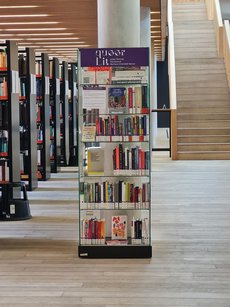Newsletter 01.2022
1. Looking back on 2021: Improved service quality during the pandemic
In the Bauhaus-Universität Weimar library, the year 2021 was shaped by the redesign and rebuild of the former circulation desk. The library collection was converted to use RFID technology for checkouts and security as a prerequisite to introducing a self-service policy. This, in turn, enabled us to considerably extend the opening hours and improve the handling of procedures related to the pandemic, another thing that shaped the past year. In 2021, the library was open on 270 days; for comparison, it was only 235 days in 2020 due to the pandemic. During the second half of the year, the library was open on Saturdays again; as well as that, unlike in 2020, there wasn’t one day in 2021 where the library had to remain closed entirely, resulting in the aforementioned difference. The pandemic has further contributed to us focusing on expanding our digital services. While we registered another rise in the use of digital resources in 2021, it was not as significant a rise as in the year before. However, in total, access numbers have doubled within only two years.
Please refer to the current press release for further results from the yearly statistic for 2021, including data points as well as resulting trends and developments.
2. Many additions to queer literature collection
The university library’s queer literature collection received numerous additions in the past months in cooperation with the student project QUEER-LIT. To highlight these books, the QUEER-LIT SHELF was moved from site to site. During January it was set up near the art collection in the Limona building and can now be found in the architecture and urbanism section on the main building’s first floor, where it sees regular use.
Additionally, the AVA streaming service has released an LGBTQ collection containing over 100 movies from Berlin-based queer film publisher Salzgeber. They include classics like »Nighthawks« (Ron Peck, UK 1978) ans »Westler« (Wieland Speck, West Germany 1985) as well as more recent productions such as »120 BPM« (Robin Campillo, France 2017) or »Moffi« (Oliver Hermanus, South Africa/UK 2019). The service, licensed by the library and shibboleth-enabled, can be accessed by Bauhaus-Universität Weimar members worldwide. Have fun exploring!
3. »Beck-Online Hochschulmodul« – new method of access
Starting this year, employees of Bauhaus-Universität Weimar may access the database »Beck-Online Hochschulmodul« remotely. Please request your personalized remote access by writing an e-mail to »erwerbung(at)ub.uni-weimar.de«, including your university e-mail address and your user name of choice. You will receive an e-mail from Beck-Online with your login details for off-campus remote access.
As before, all university members are able to access the service without personalized registration from within the university network.
4. Accessing »VDE NormenBibliothek«
The complete scope of Verband der Elektrotechnik (VDE) regulations can now be accessed online from across campus. University members also have the opportunity for remote access by VPN. The »VDE NormenBibliothek« allows direct access to all currently valid VDE regulations in full text, including drafts. Comprehensive bibliographic data is available for retired and historic VDE regulations. In accordance with the licensing terms access is restricted to read-only, and there is no way to save or print documents.
5. FAIRest Dataset Wettbewerb 2022
The FAIRest Dataset Competition is being held in Thuringia for the third time already. Until April you can enter your published dataset to have it evaluated according to FAIR principled (Findable, Accessible, Interoperable und Reusable). The winners will be announced at the annual FDM days and may receive prize money up to €2000. Please find more information on how to participate here.
6. ReproHack on March 15th 2022
In cooperation with the Open Reproducible Data Science and Statistics Gruppe (ORDS) at the University of Rostock and the Microverse Cluster at FSU Jena, a ReproHack will be held this year in Thuringia, aiming to reproduce published scientific results. The event will focus on R and Python as tools and how to use them with the platform Jupyter Notebook. You may submit your own paper along with the associated data. Participation is free. Please find more information here.
Stefanie Röhl
Sachgebietsleiterin
Informationsdienstleistungen
